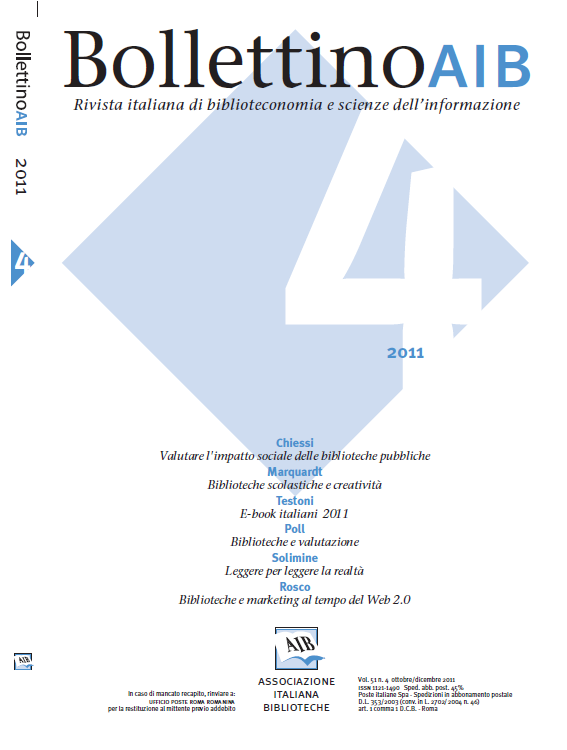La biblioteca, cuore della creatività in ogni scuola
Contenuto principale dell'articolo
Abstract
L'intervento esplora il complesso rapporto tra informazioni, creatività e innovazione soffermandosi sulle biblioteche – in particolar modo quelle scolastiche – per evidenziarne il ruolo a sostegno della creatività e delle competenze giudicate essenziali per il 21° secolo. La creatività è il risultato di un processo di apprendimento che richiede una grande quantità di informazioni e, nel percorso dinamico che va dalla creatività alla crescita economica, l’innovazione è inserita quale condizione necessaria e centrale per l’economia e lo sviluppo sociale. Garantendo il pluralismo, le biblioteche contribuiscono alla creatività e allo sviluppo e costituiscono un ambiente e uno strumento essenziale per un’efficace educazione all’informazione e alla responsabilità. La biblioteca scolastica, intesa come insieme di tre elementi base – personale, spazi, collezioni – ha un compito prevalentemente educativo e pedagogico poiché, assieme alla scuola di cui fa parte, mira a formare cittadini informati e in grado di partecipare attivamente alla società. Queste competenze sono rintracciabili anche nelle tre categorie indicate dall’OECD (Organizzazione per la cooperazione e lo sviluppo economico) e nelle otto competenze chiave per il 21° secolo individuate dall’Unione Europea. Di queste otto competenze chiave, nel curriculum scolastico italiano hanno ricevuto particolare attenzione soprattutto quelle digitali, ma è stato ignorato il potenziale apporto strategico della biblioteca. In una fase così cruciale dello sviluppo dei bambini e dei ragazzi è necessario invece assicurare agli allievi (e a tutta la comunità scolastica) servizi bibliotecari scolastici di qualità, erogati in ambienti capaci di stimolare curiosità e interessi, di comunicare accoglienza, agio e funzionalità, e di costituire quel “terzo spazio” in cui il sapere curricolare incontra e si fonde con il sapere di cui gli allievi sono portatori, secondo un sistema di apprendimento che valorizza i saperi personali e il pensiero divergente.
Anche in tempi di ristrettezze come quelli attuali, per evitare il divaricarsi della forbice sociale e sostenere l’inclusione e l’innovazione si dovrebbe investire di più nella biblioteca scolastica, particolarmente nella scuola pubblica, perché la formazione dei giovani influisce sul futuro della società.
Dettagli dell'articolo

Questo lavoro è fornito con la licenza Creative Commons Attribuzione - Condividi allo stesso modo 4.0.
